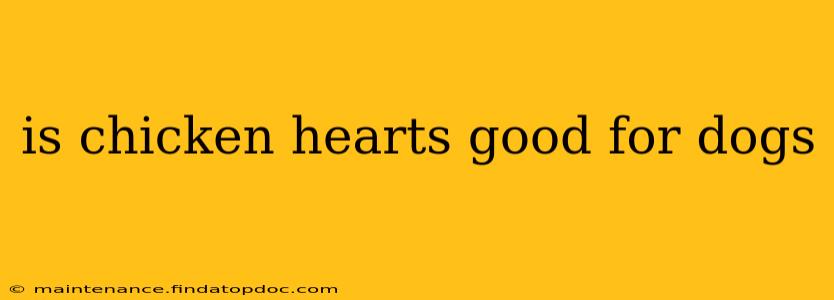Are Chicken Hearts Good for Dogs? A Comprehensive Guide
Chicken hearts, often overlooked as a human food, are gaining recognition as a nutritious and palatable treat for dogs. But are they truly good for your canine companion? The answer, like most things in pet nutrition, is nuanced. While chicken hearts offer several potential benefits, it's crucial to understand their limitations and how to incorporate them safely into your dog's diet.
This guide will delve into the nutritional value of chicken hearts, address common concerns, and provide guidelines for safe and responsible feeding.
What are the nutritional benefits of chicken hearts for dogs?
Chicken hearts are a fantastic source of high-quality protein, essential for building and repairing tissues, supporting a healthy immune system, and maintaining muscle mass. They're also rich in several key vitamins and minerals, including:
- Vitamin B12: Crucial for nerve function and red blood cell production.
- Iron: Essential for oxygen transport throughout the body.
- Selenium: A powerful antioxidant that protects cells from damage.
- Taurine: An amino acid vital for heart health and vision in dogs.
This nutrient-rich profile makes chicken hearts a potentially valuable addition to a balanced dog diet, especially for dogs with specific nutritional needs or those recovering from illness.
Are chicken hearts safe for dogs to eat?
Generally, chicken hearts are safe for dogs when properly prepared. However, several precautions are necessary:
- Thorough Cooking: Raw or undercooked chicken hearts can harbor harmful bacteria like Salmonella and E. coli, posing significant health risks to your dog. Always cook chicken hearts thoroughly until they're fully cooked through.
- Careful Sourcing: Ensure you source chicken hearts from reputable suppliers who maintain high hygiene standards. Avoid hearts from questionable sources or those showing signs of spoilage.
- Moderation is Key: While nutritious, chicken hearts should be fed as a treat, not a staple food. Overfeeding can lead to digestive upset or nutrient imbalances. They are high in fat and cholesterol, so moderation is crucial, particularly for dogs prone to weight gain or with existing health conditions.
- Introduction Gradually: When introducing any new food, including chicken hearts, to your dog's diet, do so gradually to avoid digestive upset. Start with a small amount and monitor your dog for any adverse reactions.
Can I feed my dog raw chicken hearts?
No, it's strongly advised against feeding your dog raw chicken hearts. Raw chicken can harbor dangerous bacteria that can cause serious illness in your dog. Always cook chicken hearts thoroughly before feeding them to your pet.
What are the potential risks of feeding my dog chicken hearts?
While generally safe when prepared correctly, potential risks associated with feeding chicken hearts to dogs include:
- Digestive Upset: Overfeeding or introducing chicken hearts too quickly can lead to vomiting, diarrhea, or other digestive issues.
- High Fat Content: The high fat content in chicken hearts can contribute to weight gain and pancreatitis in some dogs, especially those predisposed to these conditions.
- Potential for Bacterial Contamination: If not properly sourced and cooked, chicken hearts can carry harmful bacteria.
How often should I feed my dog chicken hearts?
Chicken hearts should be offered as an occasional treat, not a regular part of your dog's diet. A small amount, 1-2 times a week as a maximum, is generally considered safe for most healthy adult dogs. Always consult with your veterinarian before making significant changes to your dog's diet, especially if they have any pre-existing health conditions.
Are there any alternatives to chicken hearts for my dog?
Yes, there are many other healthy and delicious treats you can offer your dog, including:
- Cooked chicken breast (without added seasonings)
- Plain cooked sweet potato
- Plain cooked carrots
- Blueberries (in moderation)
- Apples (without seeds)
Remember to always prioritize a balanced and complete diet for your dog. Consult your veterinarian for personalized advice on your dog's nutritional needs.
This information is for general knowledge and does not constitute veterinary advice. Always consult with a veterinarian before making changes to your dog's diet, particularly if they have any health concerns.
